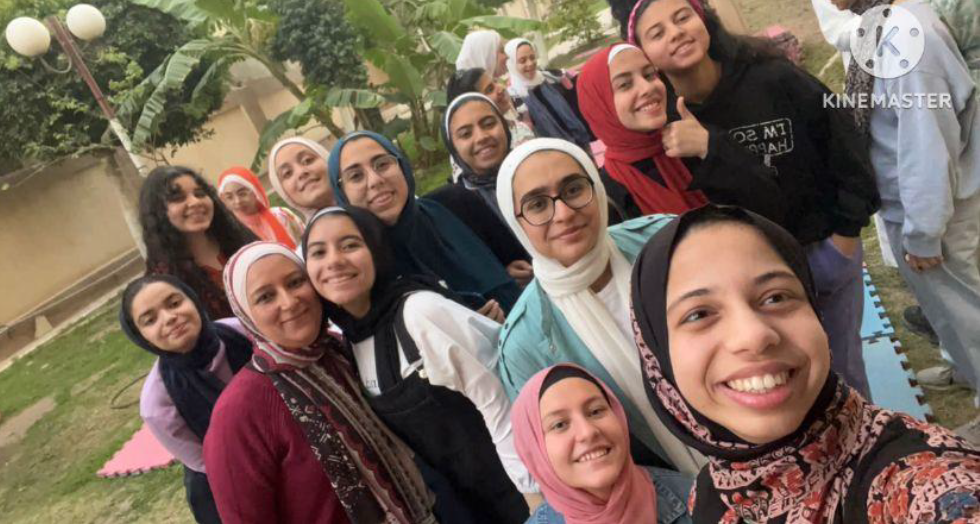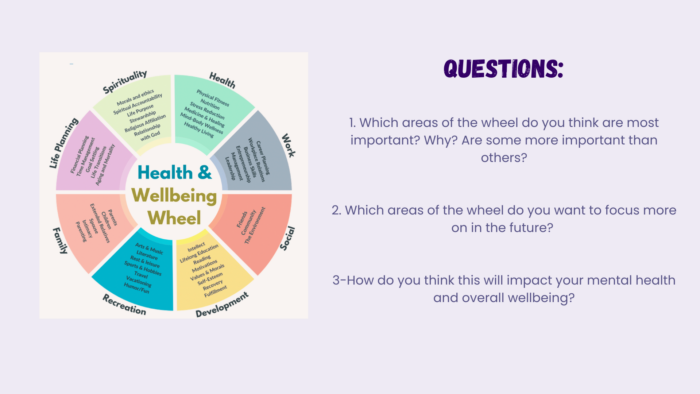By Mayra Khaled, MERGE Cohort IV Alumna
Editor’s Note: The MENA-USA Empowering Resilient Girls Exchange (MERGE) was an eight-week virtual program that brought together young women in the United States and the Middle East/North Africa (MENA) to develop practical approaches to mental health advocacy and stress coping techniques. Programming spanned four cohorts during the 2021-2023 academic semesters, and equipped participants with strategies to strengthen their mental resilience through journaling, exercise, meditation, and resources like the health and wellbeing wheel. Mayra Khaled, a MERGE Cohort IV alumna from Egypt, shares her experience with the MERGE program and how she brought the lessons learned to her school by hosting her own “MERGE Day” event.
MERGE, implemented by Global Ties U.S., is supported by the Stevens Initiative, which is sponsored by the U.S. Department of State with funding provided by the U.S. Government and administered by the Aspen Institute. The Stevens Initiative is also supported by the Bezos Family Foundation and the governments of Morocco and the United Arab Emirates.

MERGE Day participants taking a selfie outside. Photo provided by Mayra Khaled.
I appreciated being a part of the MENA-USA Empowering Resilient Girls Exchange (MERGE) program. It was incredibly motivating to see and learn about the advantages of a healthy lifestyle for women, especially teenagers, during the eight-week program, and I felt compelled to share this information with my peers, particularly since we are female Science, Technology, Engineering, and Mathematics (STEM) students. Due to the demanding nature of our coursework, we are put under a lot of stress and frequently neglect our mental health. It is therefore essential for me to remind my peers that we should put our health first in order to succeed in our careers and lead fulfilling lives.
As a part of my project, I held a day at my school called “MERGE Day.” I attend a boarding school, which made it much easier for me to plan the event because I am always with my friends. The planning was done through our dorm WhatsApp group and was set up after a planned Ramadan iftar. During MERGE Day, we discussed everything I learned in MERGE, including mental health terms, meditation, friendship networks, journaling, and sports, and ways to apply these lessons in our daily lives.
To kick off the day, we started with reviewing the health and well–being wheel, the resource that I found most interesting in the MERGE curriculum, because it helped me identify my priorities. I chose to open the day with this resource as I also wanted to learn what the attendees’ needs were, and what they thought their lives could use more of. Following this discussion, we engaged in a five-minute guided mediation to help us focus on our priorities and pinpoint areas in which we could use some improvement. It was fascinating to observe how different people had different priorities, with some emphasizing the value of physical health and others giving top priority to mental wellbeing.

Mayra’s slide introducing the Health & Wellbeing Wheel, a resource on different types of health and wellbeing. Image provided by Mayra Khaled.
The day continued with a discussion about sports and our sports role models, as a way to find motivation in what we do. I enjoyed hearing about the different sports that people enjoyed, and how they had been inspired by various athletes. We also celebrated some of our friends who won medals, and even discovered new sports that we were interested in trying out. After that discussion, we let our friends who won medals in sports lead our group through some warm up training, and we divided into teams to play a friendly game of basketball. It was a great way to bond with each other and have fun while staying active. We all left feeling energized and motivated to continue pursuing our athletic interests. We also talked about how other women in our community are not taught the importance of physical activity, and how we can help them in the future.
To build on the skills and ideas learned during MERGE Day, attendees were encouraged to form social groups. This would both empower attendees to apply their newfound knowledge to real-life situations and share their experiences with others. It would also be a more manageable way to continue MERGE Day, as planning a future event like this would depend on the amount of resources and support available. Additionally, it would be important to assess the feedback and satisfaction of attendees to determine if it is worth planning another event.
Programs like MERGE matter because they provide opportunities for academic and professional growth, and also expose us to different cultures and lifestyles, which can broaden our perspectives and help us prioritize our well–being. I feel grateful to be an alumna of the MERGE program and be able to share what I’ve learned from the program with my peers.
